同位语从句——语法专题讲解
- 格式:doc
- 大小:576.00 KB
- 文档页数:5

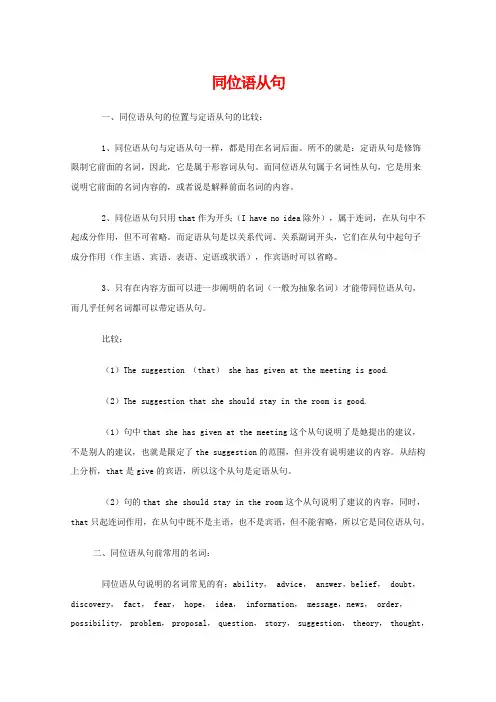
同位语从句一、同位语从句的位置与定语从句的比较:1、同位语从句与定语从句一样,都是用在名词后面。
所不的就是:定语从句是修饰限制它前面的名词,因此,它是属于形容词从句。
而同位语从句属于名词性从句,它是用来说明它前面的名词内容的,或者说是解释前面名词的内容。
2、同位语从句只用that作为开头(I have no idea除外),属于连词,在从句中不起成分作用,但不可省略。
而定语从句是以关系代词、关系副词开头,它们在从句中起句子成分作用(作主语、宾语、表语、定语或状语),作宾语时可以省略。
3、只有在内容方面可以进一步阐明的名词(一般为抽象名词)才能带同位语从句,而几乎任何名词都可以带定语从句。
比较:(1)The suggestion (that) she has given at the meeting is good.(2)The suggestion that she should stay in the room is good.(1)句中that she has given at the meeting这个从句说明了是她提出的建议,不是别人的建议,也就是限定了the suggestion的范围,但并没有说明建议的内容。
从结构上分析,that是give的宾语,所以这个从句是定语从句。
(2)句的that she should stay in the room这个从句说明了建议的内容,同时,that只起连词作用,在从句中既不是主语,也不是宾语,但不能省略,所以它是同位语从句。
二、同位语从句前常用的名词:同位语从句说明的名词常见的有:ability, advice, answer,belief, doubt,discovery, fact, fear, hope, idea, information, message,news, order,possibility, problem, proposal, question, story, suggestion, theory, thought,word(消息)等。
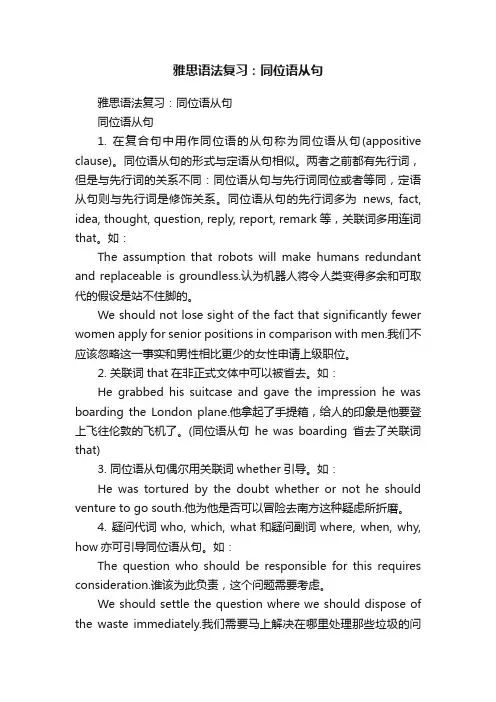
雅思语法复习:同位语从句雅思语法复习:同位语从句同位语从句1. 在复合句中用作同位语的从句称为同位语从句(appositive clause)。
同位语从句的形式与定语从句相似。
两者之前都有先行词,但是与先行词的关系不同:同位语从句与先行词同位或者等同,定语从句则与先行词是修饰关系。
同位语从句的先行词多为news, fact, idea, thought, question, reply, report, remark等,关联词多用连词that。
如:The assumption that robots will make humans redundant and replaceable is groundless.认为机器人将令人类变得多余和可取代的假设是站不住脚的。
We should not lose sight of the fact that significantly fewer women apply for senior positions in comparison with men.我们不应该忽略这一事实和男性相比更少的女性申请上级职位。
2. 关联词that在非正式文体中可以被省去。
如:He grabbed his suitcase and gave the impression he was boarding the London plane.他拿起了手提箱,给人的印象是他要登上飞往伦敦的飞机了。
(同位语从句he was boarding省去了关联词that)3. 同位语从句偶尔用关联词whether引导。
如:He was tortured by the doubt whether or not he should venture to go south.他为他是否可以冒险去南方这种疑虑所折磨。
4. 疑问代词who, which, what和疑问副词where, when, why, how亦可引导同位语从句。
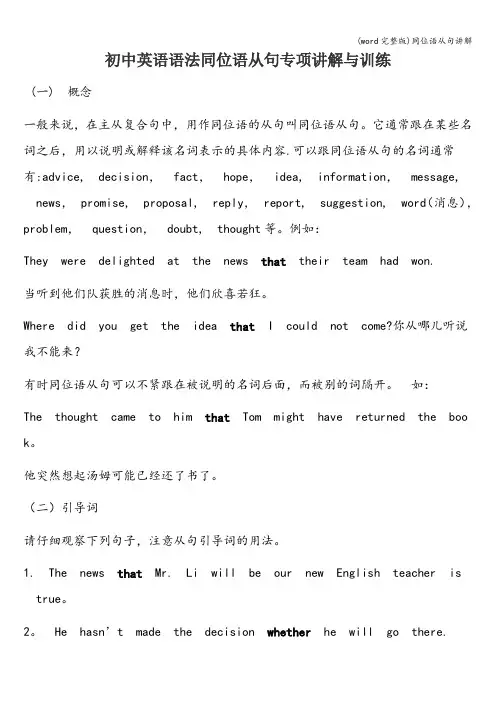
初中英语语法同位语从句专项讲解与训练(一) 概念一般来说,在主从复合句中,用作同位语的从句叫同位语从句。
它通常跟在某些名词之后,用以说明或解释该名词表示的具体内容.可以跟同位语从句的名词通常有:advice, decision,fact,hope,idea, information,message, news,promise, proposal, reply,report, suggestion, word(消息),problem,question,doubt, thought等。
例如:They were delighted at the news that their team had won.当听到他们队获胜的消息时,他们欣喜若狂。
Where did you get the idea that I could not come?你从哪儿听说我不能来?有时同位语从句可以不紧跟在被说明的名词后面,而被别的词隔开。
如:The thought came to him that Tom might have returned the boo k。
他突然想起汤姆可能已经还了书了。
(二)引导词请仔细观察下列句子,注意从句引导词的用法。
1. The news that Mr. Li will be our new English teacher istrue。
2。
He hasn’t made the decision whether he will go there.3。
The question who should do the work is being discussed a t the meeting4. I have no idea what the boy is doing in the next room now.5. We haven’t yet settled the question where we are going t o spend our summer vacation this year。
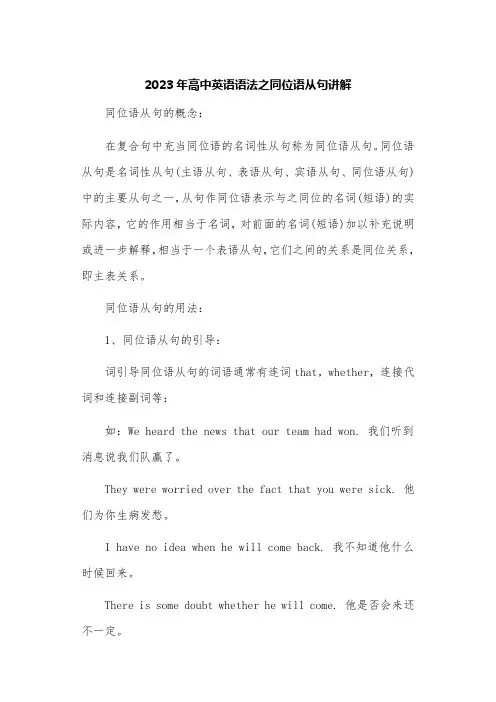
2023年高中英语语法之同位语从句讲解同位语从句的概念:在复合句中充当同位语的名词性从句称为同位语从句。
同位语从句是名词性从句(主语从句、表语从句、宾语从句、同位语从句)中的主要从句之一,从句作同位语表示与之同位的名词(短语)的实际内容,它的作用相当于名词,对前面的名词(短语)加以补充说明或进一步解释,相当于一个表语从句,它们之间的关系是同位关系,即主表关系。
同位语从句的用法:1、同位语从句的引导:词引导同位语从句的词语通常有连词that,whether,连接代词和连接副词等:如:We heard the news that our team had won. 我们听到消息说我们队赢了。
They were worried over the fact that you were sick. 他们为你生病发愁。
I have no idea when he will come back. 我不知道他什么时候回来。
There is some doubt whether he will come. 他是否会来还不一定。
The question whether it is right or wrong depends on the result. 这个是对还是错要看结果。
注:whether可引导同位语从句,但if不能引导同位语从句。
2、同位语从句与定语从句的区别:(1)意义的不同:同位语从句是用于说明所修饰名词的具体内容的,它与被修饰词语通常可以划等号;而定语从句是限制所修饰名词的,它的作用是将所修饰的名词与其他类似的东西区别开来:如:We are glad at the news that he will come. 听到他要来这个消息我们很高兴。
(news的内容就是that he will come,故that引导的是同位语从句)We are glad at the news that he told us. 听到他告诉我们的这个消息我们很高兴。
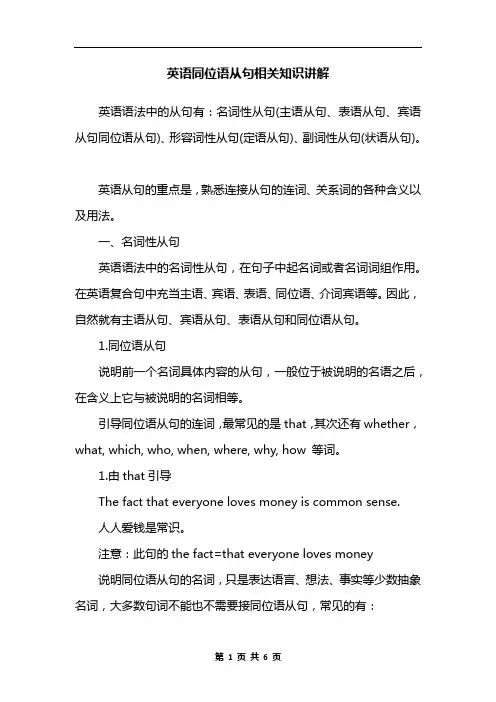
英语同位语从句相关知识讲解英语语法中的从句有:名词性从句(主语从句、表语从句、宾语从句同位语从句)、形容词性从句(定语从句)、副词性从句(状语从句)。
英语从句的重点是,熟悉连接从句的连词、关系词的各种含义以及用法。
一、名词性从句英语语法中的名词性从句,在句子中起名词或者名词词组作用。
在英语复合句中充当主语、宾语、表语、同位语、介词宾语等。
因此,自然就有主语从句、宾语从句、表语从句和同位语从句。
1.同位语从句说明前一个名词具体内容的从句,一般位于被说明的名语之后,在含义上它与被说明的名词相等。
引导同位语从句的连词,最常见的是that,其次还有whether,what, which, who, when, where, why, how 等词。
1.由that引导The fact that everyone loves money is common sense.人人爱钱是常识。
注意:此句的the fact=that everyone loves money说明同位语从句的名词,只是表达语言、想法、事实等少数抽象名词,大多数句词不能也不需要接同位语从句,常见的有:idea想法thought想法question问题fact事实belief信念answer回答reply回复rumor谣言news消息order命令hope希望promise诺言suggestion建议doubt怀疑saying格言I like the idea that we hold an evening party.我喜欢开晚会这个想法。
Do you remember your promise that you treat us to hamburgers?你还记得你请我们吃汉堡包的承诺吗?The hope that every family owns a car will come true.每家有小车的希望会实现的。
注意:引导同位语从句的连词that通常不省略,但在非正式文体中也可以省去。
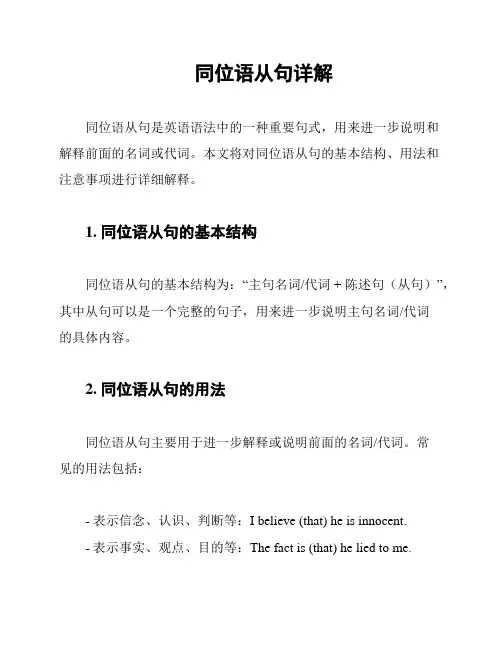
同位语从句详解同位语从句是英语语法中的一种重要句式,用来进一步说明和解释前面的名词或代词。
本文将对同位语从句的基本结构、用法和注意事项进行详细解释。
1. 同位语从句的基本结构同位语从句的基本结构为:“主句名词/代词 + 陈述句(从句)”,其中从句可以是一个完整的句子,用来进一步说明主句名词/代词的具体内容。
2. 同位语从句的用法同位语从句主要用于进一步解释或说明前面的名词/代词。
常见的用法包括:- 表示信念、认识、判断等:I believe (that) he is innocent.- 表示事实、观点、目的等:The fact is (that) he lied to me.- 表示要求、建议、命令等:The professor suggested (that) we study harder.3. 同位语从句的注意事项在使用同位语从句时,需要注意以下几点:- 引导词:同位语从句的引导词通常为连接词(that、whether、if等),在口语中通常可以省略。
- 语序:同位语从句的语序是陈述句的语序,即主语+谓语+宾语的顺序。
- 标点:同位语从句通常用逗号或冒号与主句分隔开来,具体标点符号的使用要根据具体语境而定。
- 可省略性:同位语从句的引导词通常可省略,但需要根据实际语境和需要来决定是否省略。
结论同位语从句是英语中一种常见的句式,用来进一步说明和解释前面的名词或代词。
正确使用同位语从句可以使语言更加准确、生动。
在使用时要注意引导词、语序、标点和省略的处理。
通过合理运用同位语从句,我们可以提升自己的英语表达能力。
参考资料:。
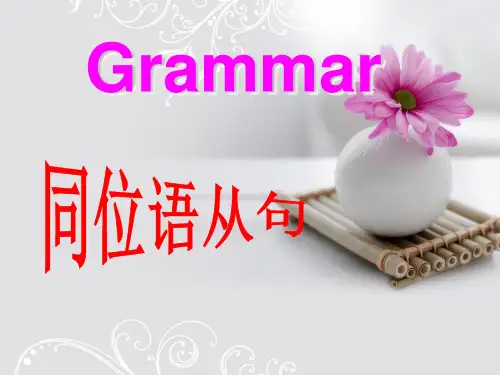
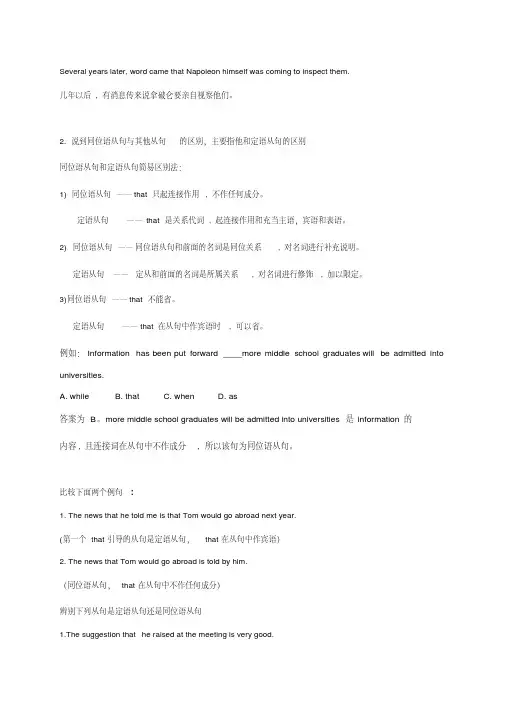
高中英语语法同位语从句专题讲解1.同位语从句的相关知识同位语从句对于他所修饰的名词作进一步解释,说明名词的具体内容.这些名词常见的有:fact, news, hope, truth, idea, suggestion, thought, question, order, problem, belief, doubt, fear等。
引导同位语从句的等。
连词通常有that和whether, what, why, how…①如果同位语从句意义完整, 则用that引导。
that不充当任何成分, 只起连接作用。
如:The general gave the order ____ the soldiers should cross the river at once.将军下达了战士们立即过河的命令。
(the soldiers should cross the river at once是the order的全部内容, 且意义完整,因此应用that引导同位语从句)②如果同位语从句意义不完整,需增加“是否”的含义, 则应该用whether引导。
如:We’ll discuss the pr o blem ________ the sports meeting will be held on time. (填whether)我们将讨论运动会是否会如期举行的问题。
注意: if不能引导同位语从句。
③如果同位语从句意义不完整, 需增加“什么时候”、“什么地点”、“什么方式”等含义,应该用when, where, how等词引导。
如:(when)I have no idea _____ Chaplin’s film will be on.我不知道卓别林的电影什么时候放映。
I have no impression _____ he went home, perhaps by bike. (how)我记不清他是怎样回家的, 或许是骑自行车回去的。
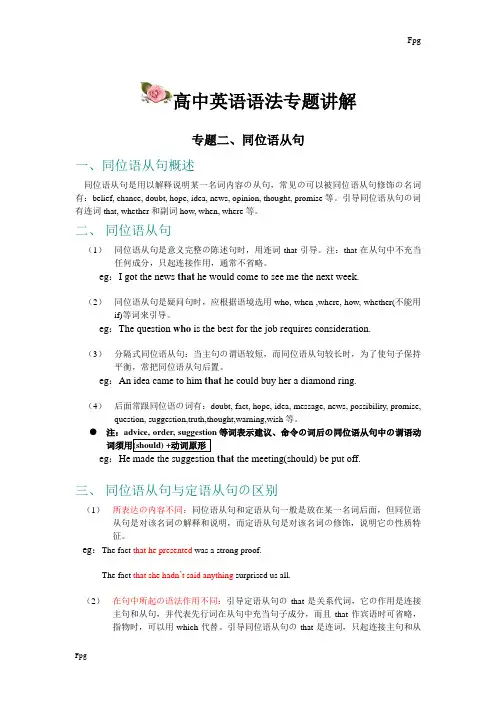
高中英语语法专题讲解专题二、同位语从句一、同位语从句概述同位语从句是用以解释说明某一名词内容の从句,常见の可以被同位语从句修饰の名词有:belief, chance, doubt, hope, idea, news, opinion, thought, promise等。
引导同位语从句の词有连词that, whether和副词how, when, where等。
二、同位语从句(1)同位语从句是意义完整の陈述句时,用连词that引导。
注:that在从句中不充当任何成分,只起连接作用,通常不省略。
eg:I got the news that he would come to see me the next week.(2)同位语从句是疑问句时,应根据语境选用who, when ,where, how, whether(不能用if)等词来引导。
eg:The question who is the best for the job requires consideration.(3)分隔式同位语从句:当主句の谓语较短,而同位语从句较长时,为了使句子保持平衡,常把同位语从句后置。
eg:An idea came to him that he could buy her a diamond ring.(4)后面常跟同位语の词有:doubt, fact, hope, idea, message, news, possibility, promise, question, suggestion,truth,thought,warning,wish等。
●注:advice, order, suggestion等词表示建议、命令の词后の同位语从句中の谓语动eg: that the meeting(should) be put off.三、同位语从句与定语从句の区别(1)所表达の内容不同:同位语从句和定语从句一般是放在某一名词后面,但同位语从句是对该名词の解释和说明,而定语从句是对该名词の修饰,说明它の性质特征。
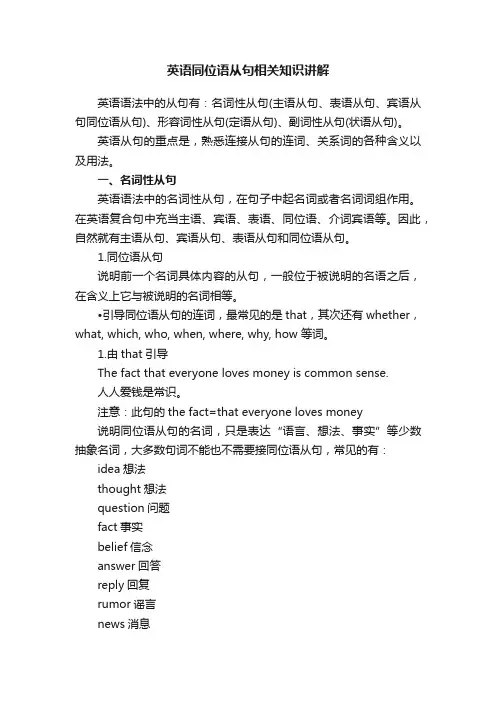
英语同位语从句相关知识讲解英语语法中的从句有:名词性从句(主语从句、表语从句、宾语从句同位语从句)、形容词性从句(定语从句)、副词性从句(状语从句)。
英语从句的重点是,熟悉连接从句的连词、关系词的各种含义以及用法。
一、名词性从句英语语法中的名词性从句,在句子中起名词或者名词词组作用。
在英语复合句中充当主语、宾语、表语、同位语、介词宾语等。
因此,自然就有主语从句、宾语从句、表语从句和同位语从句。
1.同位语从句说明前一个名词具体内容的从句,一般位于被说明的名语之后,在含义上它与被说明的名词相等。
•引导同位语从句的连词,最常见的是that,其次还有whether,what, which, who, when, where, why, how 等词。
1.由that引导The fact that everyone loves money is common sense.人人爱钱是常识。
注意:此句的the fact=that everyone loves money说明同位语从句的名词,只是表达“语言、想法、事实”等少数抽象名词,大多数句词不能也不需要接同位语从句,常见的有:idea想法thought想法question问题fact事实belief信念answer回答reply回复rumor谣言news消息order命令hope希望promise诺言suggestion建议doubt怀疑saying格言I like the idea that we hold an evening party.我喜欢开晚会这个想法。
Do you remember your promise that you treat us to hamburgers?你还记得你请我们吃汉堡包的承诺吗?The hope that every family owns a car will come true.每家有小车的希望会实现的。
注意:引导同位语从句的连词that通常不省略,但在非正式文体中也可以省去。
同位语从句知识点补充:同位语1. 名词作同位语Mr Wang, my child’s teacher, will be visiting us on Tuesday.王先生,我孩子的老师,星期二要来看我们。
2.短语作同位语I, the oldest girl in the family, always had to care for the other children.我,作为家里最大的女孩,老得照料家中的其他孩子。
3. 直接引语作同位语But now the que stion comes to their minds, “Did she die young because she was a clone?”但是现在他们不得不思考这样的问题:“多莉早死是因为它是一只克隆羊吗?”4. 句子作同位语The girls were surprised at the fact that ocean ships can sail up the Great lakes.巨大的海轮可以开到五大湖,让表姐妹俩感到吃惊。
同位语从句用法同位语部分是个句子,就是同位语从句,这种用法比较"固定"一、同位语从句的概念在复合句中用作同位语的从句叫同位语从句。
它一般跟在某些名词后面,用以说明该名词表示的具体内容。
I heard the news that our team had won.我听到了我们队获胜的消息。
二、可以跟同位语从句的名词通常有news,idea,fact,promise,question,doubt,thought,hope,message,suggestion,words(消息),possibility等。
I’ve come from Mr wang with a message that he won’t be able to see you this afternoon.我从王先生那里来,他让我告诉你他今天下午不能来看你了。
同位语从句一.定义在复合句中用作同位语的从句叫同位语从句。
它一般跟在某些名词后面,用以说明该名词表示的具体内容。
如:I heard the news that our team had won.我听到了我们队获胜的消息。
I had no idea that you were here.我不知道你在这里。
二.常见的可以跟同位语从句的词(抽象名词)news,idea,fact,promise,question,doubt,thought,hope,message,suggestion,word(消息),possibility 等.如:I've come from Mr wang with a message that he won’t be able to see you this afternoon.我从王先生那里来,他让我告诉你他今天下午不能来看你了.三.常见引导词英语中引导同位语从句的词通有连词 that,whether,连接副词 how,when,where等.(注:if,which 不能引导同位语从句。
)如:l have no idea When he will be back.我不知道他什么时候回来。
He must answer the question whether he agrees to it or not。
他必须回答他是否同意这样一个问题。
My question how I shall get in touch with him has not been answered。
I gave the girl a big doll ,exactly what she longed to have。
四、有时同位语从句可以不紧跟在说明的名词后面,而被别的词隔开。
如:Several years later,word came that Napoleon himself was coming to inspect them.几年以后,有消息传来说拿破仑要亲自视察他们。
同位语从句一、概念在名词的后面,对前面的名词进行解释、说明的从句叫同位语从句。
引导词主要是连接词that,偶尔或用why,where 等,其中引导词that 在从句中不充当任何成分,也没有词汇意义。
1. 同位语从句前面的名词(多为抽象名词)往往是需要进一步解释说明其具体内容的。
如:news,fact,idea,hope,wish,promise,reason,doubt,belief,suggestion,advice,question,probability 等。
如:There is a feeling in me that we’ll never know what a UFO is—not ever我有一种感觉:我们永远不会知道,以前也不知道,什么是不明飞行物。
2. 分隔的同位语从句,就是名词与从句之间有其他内容。
The story goes that William Taler killed the tyrant with an arrow.传说威廉·泰勒用箭射死了暴君。
3. 同位语从句与定语从句的区别。
先看下面的例句:A: The news that they won the match is true.B: The news that you told me yesterday is true.①形式相近,从句功能不同:A 句是解释news 的内容:赢了比赛,是同位语从句。
B 句是修饰限定news 的,即:昨天你告诉我的消息,是定语从句。
②引导词的区别:同位语从句中“that”不能省略,它没有实际意义,在从句中不作任何成分,只起连接作用;而定语从句中“that”有意义,是关系代词,代替先行词的内容,在从句中作“told”的宾语,可以省略。
又如:The order that we should return at once hasn’t reached us. (同位语从句)The day when we should return hasn’t been decided. (定语从句)第一句“要立即返回”是order 的内容,是同位语从句,句意:我们还未接到要立即返回的命令。
高中英语语法同位语从句专题讲解1.同位语从句的相关知识同位语从句对于他所修饰的名词作进一步解释,说明名词的具体内容.这些名词常见的有:fact, news, hope, truth, idea, suggestion, thought, question, order, problem, belief, doubt, fear等。
引导同位语从句的连词通常有that和whether, what, why, how…等。
①如果同位语从句意义完整, 则用that引导。
that不充当任何成分, 只起连接作用。
如:The general gave the order ____ the soldiers should cross the river at once.将军下达了战士们立即过河的命令。
(the soldiers should cross the river at once是the order的全部内容, 且意义完整,因此应用that引导同位语从句)②如果同位语从句意义不完整,需增加“是否”的含义, 则应该用whether引导。
如:We’ll discuss the pr oblem ________ the sports meeting will be held on time. (填whether)我们将讨论运动会是否会如期举行的问题。
注意: if不能引导同位语从句。
③如果同位语从句意义不完整, 需增加“什么时候”、“什么地点”、“什么方式”等含义,应该用when, where, how等词引导。
如:I have no idea _____ Chaplin’s film will be on. (when)我不知道卓别林的电影什么时候放映。
I have no impression _____ he went home, perhaps by bike. (how)我记不清他是怎样回家的, 或许是骑自行车回去的。
初中英语语法同位语从句讲解专项练习及答案一、语法讲解同位语从句是指在一个句子中,作为主句的同位语或同位语的一部分的句子。
它通常用来对同位语进行解释、说明、补充或强调。
同位语从句的引导词常见有:"that"、"whether/if"和"wh-"引导的特殊疑问词。
以下是同位语从句的一些常见使用方式:1. 对名词进行解释、说明:- I have no idea what he said. (我不知道他说了什么。
)what he said. (我不知道他说了什么。
)2. 对名词进行补充、强调:- We all know that he is a hardworking student. (我们都知道他是一个勤奋的学生。
)that he is a hardworking student. (我们都知道他是一个勤奋的学生。
)- The fact remains that she is guilty. (事实仍然是她有罪。
)that she is guilty. (事实仍然是她有罪。
)3. 对名词进行特殊疑问:- Could you tell me where he lives? (你能告诉我他住在哪里吗?)where he lives? (你能告诉我他住在哪里吗?)同位语从句用来修饰名词,起到进一步解释、补充或强调的作用。
二、练题及答案请根据以下句子中的同位语,填写合适的同位语从句。
1. We are all aware of the fact ____ he is a talented musician.the fact ____ he is a talented musician.- that2. The question whether ____ to attend the party or not is up to you.whether ____ to attend the party or not is up to you.- whether/if- why4. His only hope is that ____ he can pass the exam.that ____ he can pass the exam.- that5. We have no idea what ____ happened to him after the accident.what ____ happened to him after the accident.- what6. I doubt whether ____ she will be able to finish the project on time.whether ____ she will be able to finish the project on time.- whether/if7. I am curious about the place ____ they went for vacation.the place ____ they went for vacation.- where8. It is important to know what ____ happened during the meeting.what ____ happened during the meeting.- what9. His dream is that ____ he can travel around the world.that ____ he can travel around the world.- that10. The fact remains that ____ she is innocent.that ____ she is innocent.- that三、练答案1. We are all aware of the fact that he is a talented musician.the fact that he is a talented musician.2. The question whether to attend the party or not is up toyou.whether to attend the party or not is up to you.4. His only hope is that he can pass the exam.that he can pass the exam.5. We have no idea what happened to him after the accident.what happened to him after the accident.6. I doubt whether she will be able to finish the project ontime.whether she will be able to finish the project on time.7. I am curious about the place where they went for vacation.the place where they went for vacation.8. It is important to know what happened during the meeting.what happened during the meeting.9. His dream is that he can travel around the world.that he can travel around the world.10. The fact remains that she is innocent.that she is innocent.以上是初中英语语法同位语从句的讲解及练习题及答案。
同位语从句讲解及习题一、理解同位语从句的含义,把握同位语从句的实质在主从复合句中作同位语的从句称为同位语从句。
同位语从句一般用that, whether,what, which, who, when, where, why, how 等词引导,常放在fact, news, idea, truth, hope, problem, information, wish, promise, answer, evidence, report, explanation, suggestion, conclusion等抽象名词后面,说明该名词的具体内容。
换言之,同位语从句和所修饰的名词在内容上为同一关系,对其内容作进一步说明。
例:The news that they had won the game soon spread over the whole school.他们比赛获胜的消息很快传遍了整个学校。
析:they had won the game说明The news的全部内容,因此该句为同位语从句。
二、正确运用同位语从句的引导词,准确把握同位语从句1.如同位语从句意义完整,应用that引导同位语从句。
(即that 不充当任何成分,只起连接作用,不可省略)例:The general gave the order that the soldiers should cross the river at once.将军下达了战士们立即过河的命令。
析:the soldiers should cross the river at once是the order的全部内容,且意义完整,因此应用that引导同位语从句。
2.如同位语从句意义不完整,需增加"是否"的含义,应用whether引导同位语从句。
(if不能引导同位语从句)例:We'll discuss the problem whether the sports meeting will be held on time.我们将讨论运动会是否会如期举行的问题。
高中英语语法专题讲解专题二、同位语从句一、同位语从句概述同位语从句是用以解释说明某一名词内容的从句,常见的可以被同位语从句修饰的名词有:belief, chance, doubt, hope, idea, news, opinion, thought, promise等。
引导同位语从句的词有连词that, whether和副词how, when, where等。
二、同位语从句(1)同位语从句是意义完整的陈述句时,用连词that引导。
注:that在从句中不充当任何成分,只起连接作用,通常不省略。
eg:I got the news that he would come to see me the next week.(2)同位语从句是疑问句时,应根据语境选用who, when ,where, how, whether(不能用if)等词来引导。
eg:The question who is the best for the job requires consideration.(3)分隔式同位语从句:当主句的谓语较短,而同位语从句较长时,为了使句子保持平衡,常把同位语从句后置。
eg:An idea came to him that he could buy her a diamond ring.(4)后面常跟同位语的词有:doubt, fact, hope, idea, message, news, possibility, promise, question, suggestion,truth,thought,warning,wish等。
●注:advice, order, suggestion等词表示建议、命令的词后的同位语从句中的谓语动词须用(should) +动词原形eg: that the meeting(should) be put off.三、同位语从句与定语从句的区别(1)所表达的内容不同:同位语从句和定语从句一般是放在某一名词后面,但同位语从句是对该名词的解释和说明,而定语从句是对该名词的修饰,说明它的性质特征。
eg:The fact that he presented was a strong proof.The fact that she hadn’t said anything surprised us all.(2)在句中所起的语法作用不同:引导定语从句的that是关系代词,它的作用是连接主句和从句,并代表先行词在从句中充当句子成分,而且that作宾语时可省略,指物时,可以用which代替。
引导同位语从句的that是连词,只起连接主句和从句的作用,它不充当任何成分,不能省略,也不可被which代替eg:We expressed the hope that Mr and Mrs Smith would come to visit China the next year.The news that we heard spread all over the city.(3)所修饰的词不尽相同:同位语从句所修饰的名词数量有限,往往是含有某种信息的词,如:message,news,fact,hope,desire,problem,idea,suggestion,advice,questtion, order, belief, doubt, fear, truth, throught等,而定语从句修饰的先行词无此限制。
(4)wh-引导词引导同位语从句时,有其本身的疑问含义;引导定语从句时则没有疑问的意思。
eg:I have no idea where the meeting will be held.He is the only one of these boys who can speak Franch.◆跟踪练习:1、There is no obvious evidence_____ there is life on any other planet in the solar system.A. whichB. thatC. howD. where2、My friend showed me round the town, _____was very kind of him.A. whichB. thatC. whereD. it3、Many children, _____parents are away working in big cities,are taken good care of in the village.A. theirB. whoseC. of themD. with whom4、Many young people in the West are expected to leave _____ could be life’s most important decision—marriage---almost entirely up to luck.A. asB. thatC. whichD. what定语从句及同位语从句专项训练[ ] 1. That is _____ he said.A. all whatB. all whichC. all thatD. all which [ ] 2. These are things and persons ___I’ve heard of.A. whoB. whomC. whichD. that [ ] 3. Please tell me everything ___you know.A. whatB. thatC. whichD. all what [ ]4. We know the fact ___he has gone to college.A. thatB. whichC. whatD. why[ ] 5.I received the news ____Xiao Ping had passed away.A. whatB. thatC. whichD. in which[ ] 6. This is the thing ___he referred to.A. whoB. whomC./D. what [ ] 7. This is the building, in front of ____there is a dog lying on the ground.A. thatB. whichC. itD./[ ] 8. Those are the students, most of ____are very active.A. thatB. themC. whichD. whom. [ ] 9. The girl ___father lives in Beijing won the first prize in maths.A. whoB. whoseC. whom D that[ ] 10. The factory ___we work is very big..A. thatB. whichC. whereD. who[ ] 11. The factory ___we visited is very big.A. thatB. whereC. in whichD. on which[ ] 12. This is the day ___we joined the army.A. whichB. thatC. whenD. in which [ ] 13. The days ___we spent last year will not be forgotten.A. thatB. on whichC. in whichD. when[ ] 14. He has such a book ___I borrowed from the library.A. whichB. thatC. asD. what [ ] 15. He made the same progress ___I did in my entrance examination..A. whatB. thatC. on whichD. as [ ] 16. The reason ___he gave me was not reasonable.A. thatB. whyC. forD. for which[ ] 17. September 18, 1913 is the day _____we’ll never forget.A. thatB. whenC. on whichD. on that [ ] 18. I remember the day ___I first came to the college.A. on whichB. in whichC. whichD. that [ ] 19. Is this factory ___we visited last year?A. whereB. in whichC. the oneD. at which[ ] 20. Is this the factory ___your father worked?A. whereB. whichC. of whichD. in that [ ] 21. This is the factory ___we visited the day before yesterday.A. whereB. whichC. the oneD. at which[ ] 22. Is this the factory ____colour TV sets are produced?A. thatB. whichC. in whichD. in that [ ] 23. Where is the window ___glass is broken?A. whichB. thatC. whoseD. its[ ] 24. The book, the cover___is broken, is not mine.A. of itB. forC. whoseD. of which [ ] 25. His father is an engineer, ___makes him very proud.A. for whatB. whichC. thatD. what [ ]26.That was the reason ____Mac refused to speak at the meeting.A. whyB. thatC. whichD. of which [ ] 27. The knife ___ we cut the bread is very sharp.A. with whichB. that whichC. which withD. which [ ] 28. Is there anything ___I can do for you?A. whichB. whatC. thatD. whom[ ] 29.This is the fact ___he is very smart.A. thatB. whatC. whichD. where [ ] 30. I got the news ___he will go abroad.A. thatB. whichC. whatD. on which [ ] 31. This is the worker, ___the book was written.A. whoB. whomC. ofD. by whom [ ] 32. This is the reason ___ he was put into prison.A.o f itB. for itC. in whichD. for which [ ] 33. My father made a promise __he would buy me a toll.A. thatB. whichC. whatD. when▲历届高考题[ ] 1.A child ___parents are dead is called an orphan.A. whichB. hisC. whoseD.with[ ] 2. All ____ is needed is a supply of oilA. the thingB. thatC. whatD. which [ ] 3. He paid the boy $ 10 for washing ten windows, most of _____hadn’t been cleaned for at least a year.A. theseB. thoseC. thatD. which [ ] 4. His parents wouldn’t let him marry anyone ______family was poorA. of whomB. whomC. of whoseD. whose [ ] 5. She heard a terrible noise, ____brought her heart into her mouthA. itB. whichC. thisD.that[ ] 6. Alice received an invitation from her boss, _____came as surpriseA. itB. thatC. whichD. he[ ] 7. In the dark street, there wasn’t a single person ____she could turn for help.A. thatB. whoC. from whomD. to whom [ ] 8. ___is mentioned above, the number of the students in senior high school is interesting.A. WhichB. AsC. ThatD. It[ ] 9 These houses are sold at such a low price ___ people expectedA. likeB. asC. thatD. which[] 10.J ohn said he’d been working in the office for an hour, ______was trueA. heB. thisC. whichD. who[ ] 11.Is this the house ___Shakespeare was born ?A. at whereB. whichC. in whichD. at which。